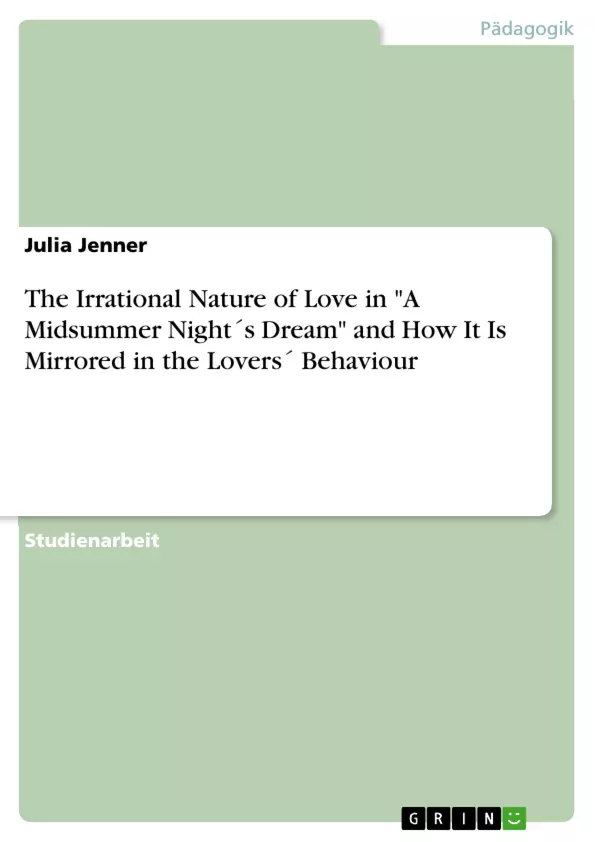In "A Midsummer Night´s Dream", Shakespeare portrays a concept of love that heavily influences the lovers´ behaviour. Therefore, love parallels a kind of madness, not only making people look foolish and blind but also being the only motivation behind their actions. Considering this, one important aspect of love in the play is its irrationality. This paper serves to shed light on aspects of the play which reveal the irrational nature of love. It takes a closer look at who, why and how the four lovers love, all under the perspective of irrationality.
Those aspects will not only be dealt with by looking at the passages of the play that reveal details about the lovers´ ideas of love but also by including claims of various authors of critical essays on the topic. The first chapter serves to find out how the nature of love manifests itself without the fairies´ intervention. In the second chapter, the focus will be on the irrationality of love which is mocked at in the enchanted wood. The paper will conclude by summarizing the most important aspects.
Inhaltsverzeichnis
- Einleitung
- Die Irrationalität der Liebe ohne Einmischung der Feen
- Die Irrationalität der Liebe im verzauberten Wald
- Schlussfolgerung
Zielsetzung und Themenschwerpunkte
Diese Arbeit untersucht die Darstellung der Liebe in Shakespeares "A Midsummer Night's Dream" und beleuchtet deren irrationale Aspekte. Der Fokus liegt auf dem Verhalten der vier Liebenden und wie ihre Handlungen von der Natur ihrer Liebe geprägt sind. Die Analyse berücksichtigt sowohl die Dialoge des Stücks als auch kritische Essays zum Thema.
- Die irrationale Natur der Liebe in "A Midsummer Night's Dream"
- Die Rolle der Feen bei der Verstärkung der irrationalen Liebeshandlungen
- Das Verhalten der Liebenden als Ausdruck von Liebesirrationalität
- Die Folgen irrationaler Liebesentscheidungen
- Die Darstellung von Liebe als eine Art Wahnsinn
Zusammenfassung der Kapitel
Einleitung: Die Einleitung führt in das Thema der irrationalen Liebe in Shakespeares "A Midsummer Night's Dream" ein. Sie skizziert die Zielsetzung der Arbeit, die darin besteht, die Aspekte der Irrationalität der Liebe im Stück zu beleuchten, indem sie das Verhalten der vier Liebenden unter dem Aspekt der Irrationalität analysiert. Dabei werden sowohl Textpassagen als auch Ansichten verschiedener Autoren kritischer Essays berücksichtigt. Die Arbeit gliedert sich in zwei Kapitel, wobei das erste Kapitel die Manifestation der Liebe ohne die Einmischung der Feen untersucht und das zweite Kapitel die im verzauberten Wald verspottete Irrationalität der Liebe behandelt.
Die Irrationalität der Liebe ohne Einmischung der Feen: Dieses Kapitel beginnt mit Hermias Widerstand gegen den Willen ihres Vaters, der als Einführung in die Irrationalität der Liebe im Stück dient. Hermias Entscheidung, Lysander zu lieben, trotz der lebensbedrohlichen Konsequenzen, wird als irrational dargestellt, da die rationale Wahl darin bestanden hätte, dem Willen ihres Vaters zu folgen. Das Kapitel analysiert weiter Demetrius' Wechsel seiner Liebe von Helena zu Hermia, ohne dass eine Begründung dafür gegeben wird. Diese Handlung wird als selbstsüchtig und Ausdruck der irrationalen Natur der Liebe interpretiert, ebenso wie Helenas darauf folgende emotionale Instabilität. Egeus' Anschuldigungen gegen Lysander werden als Darstellung eines nicht-ehrbaren Handelns interpretiert, das Hermias rationale Entscheidungsfähigkeit beeinträchtigt. Das Kapitel untersucht die Beschreibung der Liebe als Zauberspruch und die flüchtige Natur der Liebe bei Hermia und Lysander, im Gegensatz zu Lysanders anhaltender Liebe zu Hermia bevor die Magie eingreift. Schließlich wird Demetrius' anhaltende Liebe zu Hermia trotz deren Ablehnung als irrational bewertet, ebenso wie Helenas verzweifelte Verfolgung von Demetrius, die als Ausdruck von Wahnsinn interpretiert wird. Helenas Verrat an Hermia wird als Ursache für den Bruch ihrer Freundschaft dargestellt.
Schlüsselwörter
Irrationale Liebe, Shakespeare, A Midsummer Night's Dream, Liebesverhalten, Feen, Magie, Wahnsinn, Hermia, Lysander, Demetrius, Helena, Autorität, emotionale Instabilität.
Häufig gestellte Fragen zu: Irrationale Liebe in Shakespeares "A Midsummer Night's Dream"
Was ist der Gegenstand dieser Arbeit?
Diese Arbeit analysiert die Darstellung irrationaler Liebe in Shakespeares "A Midsummer Night's Dream". Der Fokus liegt auf dem Verhalten der vier Liebenden (Hermia, Lysander, Demetrius, Helena) und wie ihre Handlungen von der Natur ihrer Liebe geprägt sind. Die Analyse berücksichtigt Dialoge des Stücks und kritische Essays.
Welche Themen werden behandelt?
Die Arbeit untersucht die irrationale Natur der Liebe im Stück, die Rolle der Feen bei der Verstärkung dieser Irrationalität, das Verhalten der Liebenden als Ausdruck von Liebesirrationalität, die Folgen irrationaler Liebesentscheidungen und die Darstellung von Liebe als eine Art Wahnsinn.
Welche Kapitel umfasst die Arbeit?
Die Arbeit gliedert sich in eine Einleitung, ein Kapitel über die Irrationalität der Liebe ohne Einmischung der Feen, ein Kapitel über die Irrationalität der Liebe im verzauberten Wald und eine Schlussfolgerung.
Was wird im Kapitel "Die Irrationalität der Liebe ohne Einmischung der Feen" behandelt?
Dieses Kapitel analysiert Hermias Widerstand gegen ihren Vater, Demetrius' wechselnde Liebe, Helenas emotionale Instabilität und Egeus' Anschuldigungen. Es untersucht die flüchtige Natur der Liebe bei Hermia und Lysander im Gegensatz zu Lysanders anhaltender Liebe vor dem magischen Eingriff, Demetrius' anhaltende Liebe trotz Hermias Ablehnung und Helenas verzweifelte Verfolgung von Demetrius, die als Ausdruck von Wahnsinn interpretiert wird. Der Verrat Helenas an Hermia wird als Ursache für den Bruch ihrer Freundschaft dargestellt.
Welche Schlüsselwörter beschreiben die Arbeit?
Irrationale Liebe, Shakespeare, A Midsummer Night's Dream, Liebesverhalten, Feen, Magie, Wahnsinn, Hermia, Lysander, Demetrius, Helena, Autorität, emotionale Instabilität.
Welche Zielsetzung verfolgt die Arbeit?
Die Arbeit beleuchtet die Aspekte der Irrationalität der Liebe in "A Midsummer Night's Dream" durch die Analyse des Verhaltens der vier Liebenden unter dem Aspekt der Irrationalität. Dabei werden sowohl Textpassagen als auch Ansichten verschiedener Autoren kritischer Essays berücksichtigt.
Wie ist die Arbeit aufgebaut?
Die Arbeit enthält ein Inhaltsverzeichnis, eine Einleitung mit Zielsetzung und Themenschwerpunkten, eine Zusammenfassung der Kapitel und eine Liste der Schlüsselwörter.
- Citar trabajo
- Julia Jenner (Autor), 2019, The Irrational Nature of Love in "A Midsummer Night´s Dream" and How It Is Mirrored in the Lovers´ Behaviour, Múnich, GRIN Verlag, https://www.grin.com/document/1163780



